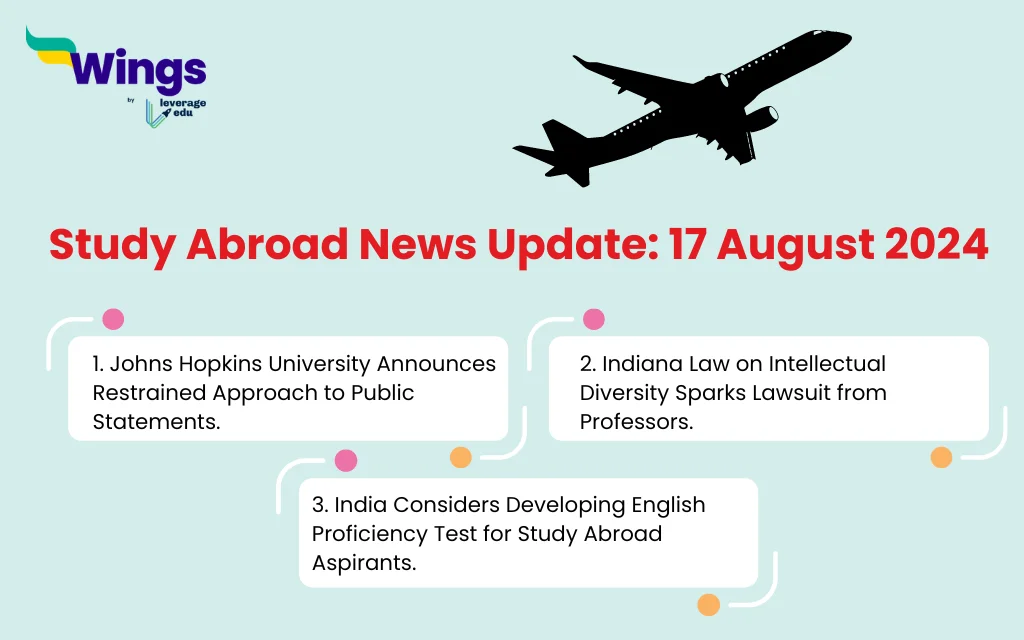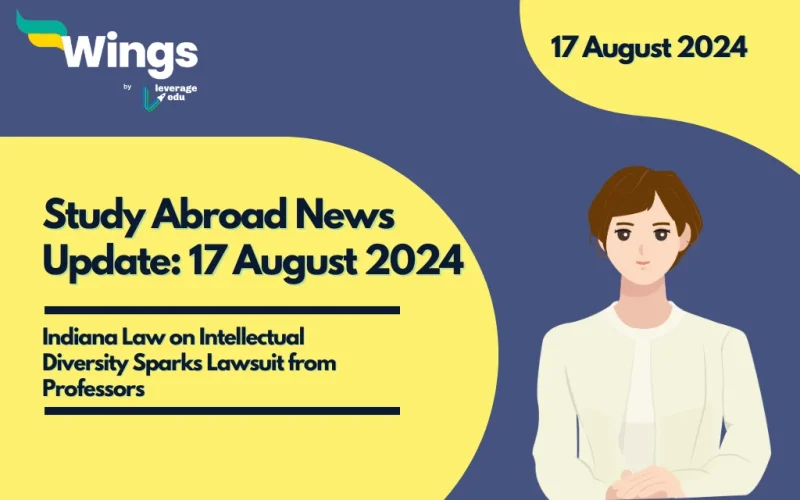Study Abroad News Updates for 17 August 2024: Stay informed of the latest updates in international education as of 17 August 2024. We bring you essential news on recent changes and trends that matter for students planning to study abroad. Our insights will guide you through your international education journey with confidence.
News Highlights: Study Abroad For Indian Students
Stay updated on study abroad programs, policies, and trends that affect international students.

Our news highlights provide valuable information to help you stay ahead in your global education journey.
| 1. Johns Hopkins University announced a decision to limit its public statements on sensitive global issues such as human rights violations and military conflicts. The university’s leaders will only speak out on issues directly related to its core mission to protect academic freedom and ensure diverse perspectives. 2. Indiana lawmakers passed a law requiring public universities to deny tenure to professors who do not cater to intellectual diversity. The law applies to both new and tenured professors, and its impact has sparked a lawsuit from faculty members. They argue that it infringes on their First Amendment right to academic freedom, a claim the state government disputes. 3. A push for an India-developed English language test may reduce the financial strain on students aiming for foreign education. This initiative, suggested by Parliament member Kartikeya Sharma, aims to create a more affordable and accessible alternative to international exams, potentially increasing global education opportunities for Indian students. |
Essential Study Abroad News for Indian Students: Key Updates and Trends
Explore the essential study abroad news designed for Indian students aspiring to study abroad. Learn about new opportunities, visa details, and practical tips for a smooth international education experience.
| 1. Johns Hopkins University Announces Restrained Approach to Public Statements Johns Hopkins University leaders announced a new policy to exercise caution in making public statements about human rights violations, military conflicts, and other sensitive global issues. In a letter signed by President Ron Daniels and other senior administrators, they stated the university will now issue statements only when the issue directly relates to the institution’s core interests. The goal is to protect academic freedom and ensure a diverse range of opinions on campus. The leaders emphasized that universities are places for open debate and truth-seeking. While making statements may seem appropriate during difficult times, they can sometimes conflict with the university’s mission. This decision comes after recent campus protests over issues like the Israel-Hamas war and debates on whether university leaders should comment on current events. Why This Matters for Indian Students For Indian students aspiring to study abroad, especially at universities like Johns Hopkins, this move highlights the institution’s dedication to promoting free speech and diverse viewpoints. By maintaining neutrality on global events, the university aims to create an environment where students from different backgrounds feel free to express their opinions. Indian students can benefit from this approach as it ensures they can engage in open dialogue without fear of institutional bias or pressure. Additionally, this decision shows the university’s commitment to focusing on education and research, which is critical for students pursuing academic excellence. |
| 2. Indiana Law on Intellectual Diversity Sparks Lawsuit from Professors In February, Indiana lawmakers passed a law requiring public colleges and universities to deny tenure to professors who are “unlikely to foster intellectual diversity.” The law tasks university trustees, many appointed by the governor, with determining what intellectual diversity means and whether faculty members promote it. Even tenured professors are affected, as their post-tenure reviews, held every five years, will now include an evaluation of their promotion of diverse political or ideological perspectives. Poor reviews could result in the loss of both tenure and employment. In response, four faculty members from Indiana and Purdue universities filed a lawsuit in May to challenge these parts of the law. Represented by the American Civil Liberties Union of Indiana, the professors argue that the law infringes on their First Amendment right to academic freedom. They believe that faculty should have the freedom to teach without state interference. However, Indiana’s Attorney General, Todd Rokita, defends the law by claiming that professors at state universities do not have a First Amendment right to academic freedom. He argues that curriculum at public universities is considered “government speech” and should align with state laws. This position echoes similar legislative efforts in other states, like Florida. Critics of the law, including Steve Sanders, a law professor at Indiana University, argue that the Supreme Court has long recognized academic freedom as a key aspect of the First Amendment. Why This News Matters for Indian Students Indian students planning to study in the U.S., particularly in states like Indiana, should be aware of the changes in academic environments. These new regulations may impact the teaching style and content delivered in classrooms, potentially limiting exposure to diverse viewpoints. For Indian students, this law raises concerns about the extent to which academic freedom will continue to thrive, especially in public universities, which are often popular choices for international students due to their affordability and reputation. Understanding these dynamics is crucial when selecting universities abroad. |
| 3. India Considers Developing English Proficiency Test for Study Abroad Aspirants Indian students aspiring to study abroad may soon see a new English language proficiency test developed by India, according to a recent discussion in the Parliament. Kartikeya Sharma, a Parliament member, emphasized that the current English-language testing industry, dominated by foreign entities, generates billions in revenue annually. Popular exams like IELTS and TOEFL are essential for students to secure admission to English-speaking institutions overseas, but they come with high costs. Students pay around Rs 17,000 ($204) for these tests, and additional expenses for coaching, study materials, and travel add to the financial burden. Sharma highlighted the need for a more affordable and accessible solution. He proposed that India’s Ministry of Education create its own English proficiency test that meets international standards. The aim is to make it easier for students, particularly those from economically disadvantaged backgrounds, to access education abroad. This could help reduce costs and make higher education opportunities more achievable for a larger number of students. While experts acknowledge that developing such a test won’t be easy, many support the idea. If implemented, it could increase opportunities for Indian students and level the playing field in the competitive global education market. Why This News Matters for Indian Students This initiative could provide Indian students with a cost-effective alternative to expensive foreign exams like IELTS and TOEFL. By reducing the financial burden, more students, especially those from low-income backgrounds, would have the chance to pursue education abroad. Additionally, a locally developed test could streamline the process, allowing easier access to global education without the high costs currently associated with language proficiency tests. |
Study Abroad Lingo: Your Guide to Key Terms and Phrases
Understand important terms related to studying abroad with our easy-to-use lingo guide. This resource simplifies the language of international education, making your study abroad journey easier to navigate.
| Word | Meaning | Sentence |
| Fellowship | Money is provided to students to help pay for their education, often in the form of scholarships, grants, or loans. | She received a fellowship to support her PhD studies in the UK. |
| Fluency | The ability to speak, write, or understand a language smoothly and easily. | Achieving fluency in English will help you succeed in your studies abroad. |
| Financial Aid | Money provided to students to help pay for their education, often in the form of scholarships, grants, or loans. | Many international students rely on financial aid to cover their tuition fees. |
Stay informed about the Study abroad news update with Leverage Edu News Desk and plan your journey with Leverage Edu today!


 One app for all your study abroad needs
One app for all your study abroad needs












 60,000+ students trusted us with their dreams. Take the first step today!
60,000+ students trusted us with their dreams. Take the first step today!